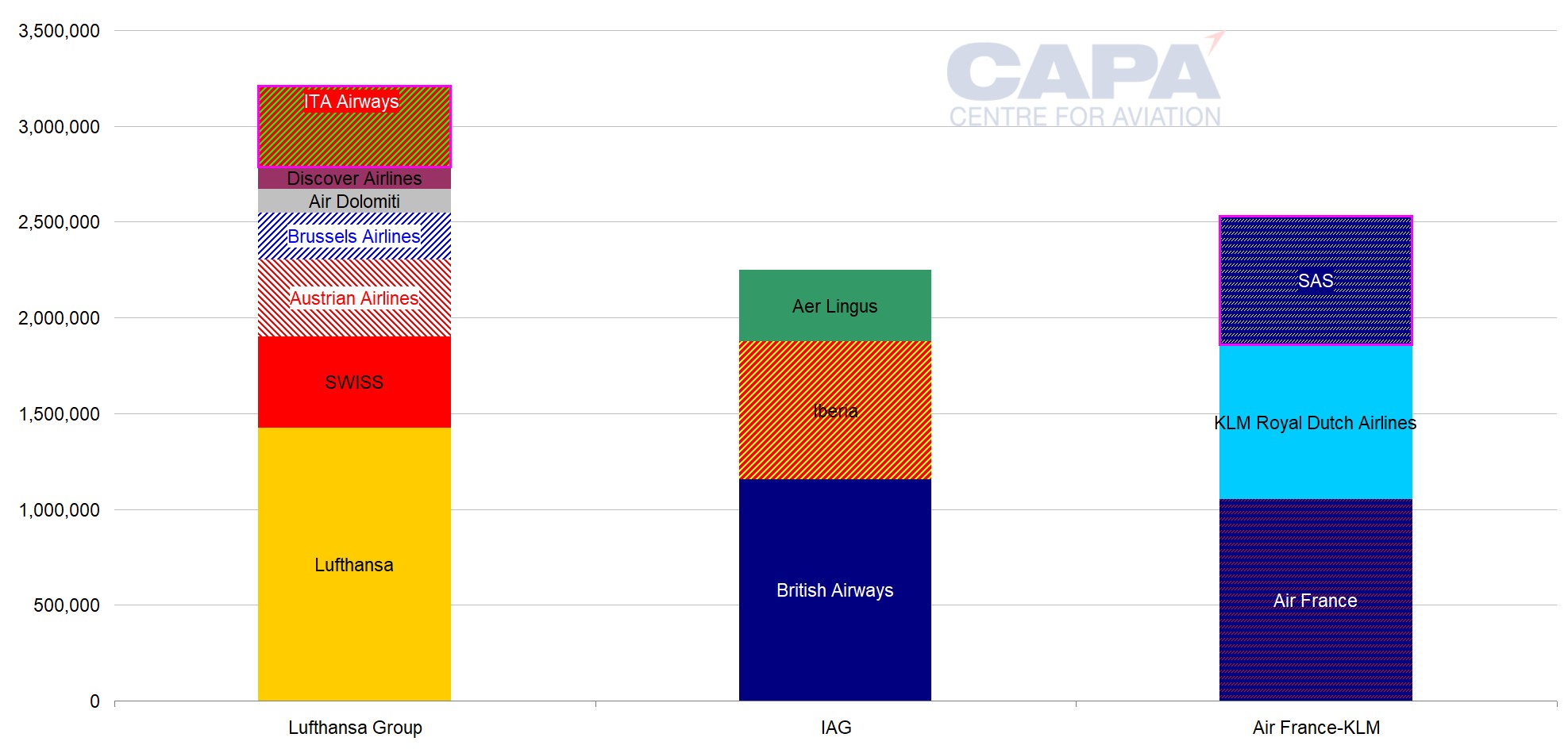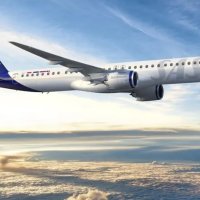Two significant strategic developments in early Jul-2025 demonstrate how far SAS has progressed since the COVID-19 pandemic crisis forced it into a major restructuring programme in 2020.
Firstly, SAS announced an order for 45 new generation Embraer E195-E2s, plus 10 options. This is its largest order direct from an OEM since 1996.
Secondly, Air France-KLM announced that it will increase its stake in SAS from 19.9% to 60.5% (subject to regulatory approval).
These two announcements signal growing confidence about SAS’ future, both on its own part and on the part of its main airline partner and shareholder.
Summary
- SAS Group’s current fleet comprises 117 aircraft, including 13 Embraer regional jets.
- Its E195-E2 order allows for replacement and growth of its regional fleet.
- Air France-KLM is to increase its stake in SAS to 60.5%, allowing greater integration and synergies.
- Air France-KLM’s network airlines have less capacity than Lufthansa Group’s and IAG’s, but the addition of SAS narrows the gap.
- The deal is another step in European consolidation, but Europe remains more fragmented than North America.
SAS Group’s current fleet comprises 117 aircraft, including 13 Embraer regional jets
As at 7-Jul-2025, SAS Group has a current fleet of 117 aircraft (including three inactive).
This comprises 13 Embraer 195 regional jets, two Boeing 737s, 90 Airbus A320 family aircraft (of which 77 are -neos), eight A330-300s and four A350-900s.
The 12 widebodies and 60 of the narrowbodies are operated by the SAS itself, while 32 Airbus A320neos are operated by ‘SAS Connect’, the group’s Irish registered subsidiary, which has bases at London Heathrow and Málaga.
The A330 fleet has an average age of 14.0 years, whereas the A350s average only 4.8 years. Setting aside the two ageing 737s (which will exit the fleet later this year), SAS’ narrowbody fleet are only 6.3 years old, on average.
However, the 13 Embraer 195 regional jets, operated by SAS Link, are the oldest significant sub-fleet. They range between seven and 18 years old, and have an average age of 14.3 years.
Its E195-E2 order allows for replacement and growth of its regional fleet
The group’s order for 45 Embraer E195-E2s, with options for a further 10, allows for both the replacement and the expansion of its regional fleet. Deliveries are scheduled to start in 2027 and to continue until 2013.
Powered by Pratt & Whitney PW1900G engines, the E2 family offers 29% better fuel efficiency and a 62% lower noise footprint than Embraer’s previous generation regional jet, according to the manufacturer.
The decision to stick with Embraer for its regional fleet looks positive for both parties. For SAS, it will simplify the transition for flight crew and technical staff when the new aircraft are delivered.
It also seems reasonable to assume that Embraer gave SAS a very attractive price – given the size of the order.
Moreover, the manufacturer recently lost out to the Airbus A220 for an important order by LOT Polish Airlines. It will be relieved to secure the SAS order and is likely to have included a price sweetener.
See related CAPA – Centre for Aviation report: LOT Polish Airlines: A220 order, its first with Airbus, completes strategic fleet upgrade
Air France-KLM is to increase its stake in SAS to 60.5%…
News of SAS’ regional aircraft order was swiftly followed by the announcement by Air France-KLM that it would increase its equity stake in SAS from 19.9% to 60.5%.
It will do this by acquiring the current stakes held by the investors Castlelake and Lind Invest. The Danish State plans to keep its 26.4% stake and its seat on the board of SAS.
Air France-KLM’s acquisition is subject to regulatory approval and satisfaction of all conditions precedents, and is expected to complete in 2H2026.
The transaction, if and when it closes, will give Air France-KLM control of SAS, which will become a subsidiary of the group.
…allowing greater integration and synergies
This will allow much deeper integration than under their current commercial relationship, which includes interline, codeshare and reciprocal loyalty scheme agreements and mutual membership of SkyTeam (which SAS joined in Sep-2024, after 27 years in the Star Alliance).
The consolidation of SAS into the Air France-KLM group also offers more significant synergy potential beyond that of a commercial partnership.
In addition to revenue synergies, it should also bring benefits on the cost side, in areas such as procurement, IT and administrative activities.
In seat capacity terms, the inclusion of SAS will bring Air France-KLM’s network airlines more on a level with its two great European rivals – Lufthansa Group and IAG.
According to data from CAPA – Centre for Aviation/OAG for the week of 7-Jul-2025, Lufthansa Group’s network airlines have a combined capacity of 2.8 million seats and IAG’s have 2.2 million.
Air France-KLM currently offers 1.9 million network airline seats, placing it firmly in third place.
Note that these figures do not include the low cost subsidiaries of the three groups.
Lufthansa Group, IAG and Air France-KLM: network airlines global capacity, week of 7-Jul-2025
Source: CAPA – Centre for Aviation, OAG.
…but the addition of SAS narrows the gap
On a pro forma basis, using data for the week of 7-Jul-2025, the integration of SAS into Air France-KLM takes it to 2.5 million network airline seats. This places it ahead of IAG and narrows the gap between it and Lufthansa Group.
However, the addition of ITA Airways into the Lufthansa Group would give the German-led combination up to 3.2 million network airline seats.
Lufthansa has a minority (41%) stake in ITA currently, but is likely to increase this to a controlling stake over time.
Lufthansa Group, IAG and Air France-KLM: network airlines pro forma global capacity with acquisition targets added, week of 7-Jul-2025

Source: CAPA – Centre for Aviation, OAG.
Another step in European consolidation…
Looking more broadly at the impact on European consolidation, SAS brings an additional 1.9% of all Europe seat share to Air France-KLM’s overall share of 7.4% (including its Transavia low cost division).
This would place the enlarged group just ahead of IAG in third place in Europe, behind Ryanair on 12.9%, and Lufthansa Group on 9.9%. Lufthansa Group’s share would rise to 11.1% with the addition of ITA Airways.
If the Air France-KLM/SAS and Lufthansa/ITA deals complete, the top four share in Europe will rise from 39.2% to 42.3%.
Europe: top 4 airline groups by seat share, week of 7-Jul-2025
*Adds ITA Airways to Lufthansa Group and SAS to Air France-KLM.
Source: CAPA – Centre for Aviation, OAG.
…but Europe remains more fragmented than North America
However, this is still much less than the North America top four share of 62.5% (based on schedules for the week of 7-Jul-2025).
Air France-KLM’s planned acquisition of a controlling stake in SAS is another step in the process of European airline consolidation, but the pace remains slow and piecemeal.
SAS has come a long way since entering a restructuring in 2020
The recent strategic developments in the story of SAS highlight its progress since starting a corporate restructuring in 2020.
Recapitalisations, bankruptcy protection, state aid, debt, fleet and cost reduction, network optimisation and revenue growth have all been part of its journey since the depths of the COVID-19 crisis.
This led to its return to a positive result at the net profit level in FY2024 (year to October).
SAS’ largest OEM aircraft order in almost 30 years, and its pending acquisition by one of Europe’s leading airline groups, signal its renewed self-belief.
Anko van der Werff, President and CEO of SAS said that the Embraer order was a “major investment”, which “reflects our confidence in the future”.
Referring to the acquisition of his airline by Air France-KLM, Mr van der Werff said it “would mark a defining moment for SAS and a strong signal of confidence in the direction we’re heading”.
This optimism is also reflected in Air France-KLM’s view of SAS.
Referring to its “impressive performance”, the Franco-Dutch group’s CEO, Benjamin Smith, said “SAS has delivered, and we are confident that the airline’s potential will continue to grow through deeper integration within the Air France-KLM Group”.
